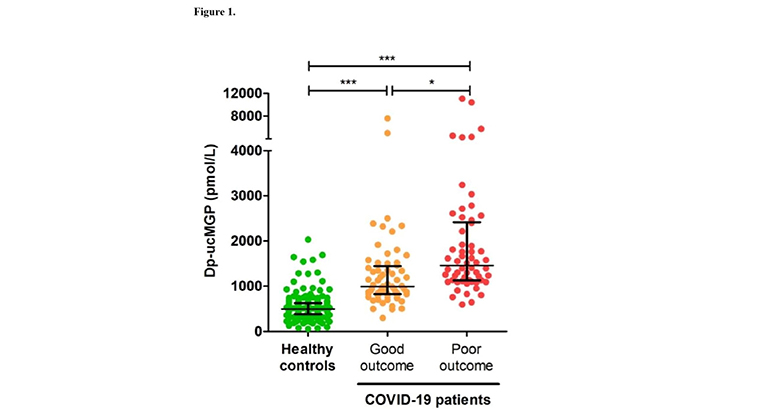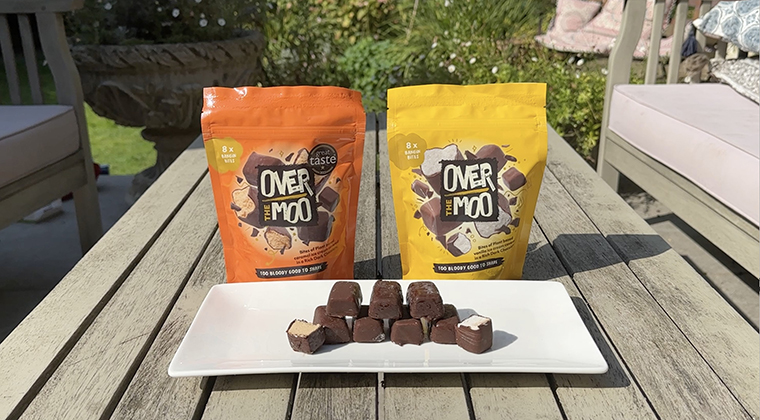Desphospho-uncarboxylated matrix Gla protein (Dp-ucMGP) is a biomarker which inversely shows the levels of vitamin K in the patient; the higher the level of Dp-ucMGP the patient has, the lower the levels of vitamin K1 and K2.
Vitamin K has long been proven to play a vital role in coagulation. Coagulation is an intricate balance between clot promoting and dissolving processes.
The research, published in the journal Preprints (full, original research document attached), which is yet to be peer-reviewed, found that Dp-ucMGP levels were significantly higher in COVID-19 patients with unfavourable outcomes compared to those with less severe disease. The study concluded that the Vitamin K status was reduced in patients with COVID-19 and related to poor prognosis.
Coronavirus 2019 (COVID-19) is caused by the severe acute respiratory syndrome coronavirus-2. The majority of patients have at most mild symptoms, however, a significant proportion develops respiratory failure. COVID-19 may also progress beyond the lungs. Coagulopathy and thromboembolism are prevalent in severe COVID-19 and relate to decreased survival.
Patients were followed until they reached one of three endpoints: 1) discharge from the hospital, 2) admission to the intensive care unit (ICU) for intubation and mechanical ventilation, or 3) death. Outcome of COVID-19 patients was categorised as “good” if they were discharged from the hospital without the need for invasive ventilation, and “poor” if they either needed mechanical ventilation or died.
The study also backed up previous 2019 research which showed low vitamin K status seems to be associated with accelerated elastin degradation. Elastin is a highly elastic protein that is found in connective tissue in the lungs and skin, for example. It allows body tissue to resume its shape after stretching or contracting – vital for lung function. Covid-19 has shown to cause breathing problems from lung degeneration. A further study is now taking place to assess whether vitamin K administration improves outcome in patients with COVID-19.
“While we do not suggest vitamin K2 is a treatment for COVID-19, this study illustrates that a poor vitamin K status is linked to a poor prognosis. Thus, we are hypothesising that improving vitamin K2 status is linked to better health outcomes including cardiovascular, and perhaps even lung health,” explains Leon Schurgers, Professor of Biochemistry of Vascular Calcification and Vice Chair of Biochemistry at the Cardiovascular Research Institute Maastricht (CARIM), Maastricht University, and co-author of the study.
How to get Vitamin K in to your diet
K2 is a vitamin that most people have never heard of however it is essential for transporting and distributing calcium around the body – helping to prevent osteoporosis and improve bone health. There is little benefit in taking calcium supplements without maintaining enough vitamin K2 in your diet.
Vitamin K2 is found in high-fat animal foods such as egg yolks and grass-fed cows, as well as fermented foods such as sauerkraut, fermented soy and miso. It is hard to consume enough vitamin K from diet alone and so most people require supplements.
Article supplied by Wiley’s Finest™
Wiley’s Finest Vitamin K2 is available for home delivery and combines MenaQ7® Vitamin K2 and Vitamin D3, with EPA & DHA Omega-3s from MSC-certified, sustainable Wild Alaskan Fish Oil. Together these nutrients support optimal bone and heart health by helping to incorporate calcium into bones.
Wiley’s Finest™ Peak Vitamin K2 is available at the recommended retail price of £34.99 for 60 softgel capsules (2 month’s supply). Available online and from independent health food shops and pharmacists across the UK.







